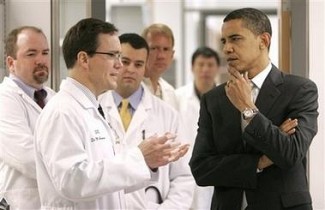The latest report from the Congressional Budget Office highlights a number of reasons why the CBO is concerned about the implementation of Obamacare. It boils down to this: Obamacare is going to be more expensive than the Obama administration thought, disrupt the marketplace more than they thought, and be tougher to implement than they thought.
First, more expensive: The CBO significantly hiked the amount of money needed to fund the subsidies available through Obamacare’s exchanges, hiking them by $233 billion. IBD explains: “The CBO’s new baseline estimate shows that ObamaCare subsidies offered through the insurance exchanges — which are supposed to be up and running by next January — will total more than $1 trillion through 2022, up from $814 billion over those same years in its budget forecast made a year ago. That’s an increase of nearly 29%. The CBO upped the 10-year subsidy cost by $32 billion since just last August.” Part of that is expecting more people in the exchanges thanks to employer dumping and more limited Medicaid expansion, but “The rest is largely the result of the CBO’s sharp increase in what it expects the average subsidy will be. Last year, the CBO said the average exchange subsidy for those getting federal help when ObamaCare goes into effect next year would be $4,780. Its latest estimate raised that to $5,510 — a 15% increase. All these numbers are up even more from the CBO’s original forecast made in 2010, which had the first-year subsidy average at $3,970.”
Second, more disruptive: More employees will be dropped from their existing plans and fewer uninsured people will get coverage. The WSJexplains: “The CBO has long said it expects the new federal health law will prompt some companies to drop millions of employees from health plans because workers have new options to buy insurance on their own. In August, CBO put the number at four million over 10 years. Now it’s seven million. What changed? Nothing about the health law. Rather, the cliff deal that was enacted in January. When CBO crunched the numbers in August, it assumed that no cliff deal would be reached and higher tax rates would kick in. Economists typically assume that higher tax rates mean that more people are offered, and accept, employer-provided health benefits, says Paul Fronstin, a senior research associate at the Employee Benefit Research Institute. That’s because health benefits are tax-deductible for companies, and so are any premiums that the employee is required to contribute.”
Third, more difficult to implement: The CBO isn’t buying the administration’s repeated assurances that everything will be ready to go on time when it comes to the health insurance exchanges. From the report: “CBO and JCT [Joint Committee on Taxation] have slightly reduced their estimates of the rates at which people will enroll in the insurance exchanges or Medicaid as the expansion of coverage is implemented—a process that had already been anticipated to occur gradually. That change reflects the agencies’ judgment about a combination of factors, including the readiness of exchanges to provide a broad array of new insurance options, the ability of state Medicaid programs to absorb new beneficiaries, and people’s responses to the availability of the new coverage.”
National Journal explains: “Publicly, administration officials have promised that the new exchanges will be ready on time… But the CBO report expresses skepticism… In plain language, that means CBO thinks the marketplaces won’t have many insurance choices, the Medicaid enrollment systems will not be ready for new people to enroll, and people will be less enthusiastic about signing up for new insurance options.”
Taken together, this is a report that shows how already, Obamacare is failing to match the hopes of its creators in many respects. Expect this trend to continue in future years. This is going to be a lot of political fractiousness and market disruption over a policy which may ultimately end up nudging the insured percentage up only slightly.
[First published at RealClearPolitics.]





